Transformation through Training
Tadashi Suzuki and Anne Bogart on the Suzuki Method
This transcript has been edited for length. The full conversation can be viewed at SITI’s website here or at HowlRound TV. Download the full transcript here.
Anne Bogart: Thank you so much for the warm welcome, but save your welcome for an even warmer one. If we haven’t met, I’m Anne Bogart. I’m one of the three artistic directors of SITI Company and this is the final event of the symposium we’ve held for the last three days. I’m speaking now to people who don’t know what the hell you’re doing here...just showed up.
It’s been called “transformation through training.” And I think the more we’ve gone through these days together it’s been clearly exactly those words: “transformation through training.” I think all of us have felt the impact of what this training has meant, what Suzuki’s influence is, and it’s been very moving.
So welcome to those who don’t know what you’re doing here, this is a conversation with Suzuki Tadashi, but first of all I just want to thank you for being here this morning. The most important part of what I have to say is welcome to HowlRound. We are being livestreamed right now and so there are people who are not in the room who are in the room in a very different way. We’re trying to learn what that means, to be in the room and not in the room at the same time so this is part of that attempt to understand that. So welcome to HowlRound, welcome to those who are watching. Kameron Steele, who has been with Suzuki for a long time, is going to be translating.
So I’m not sure Suzuki-san where you’d like to start…
Tadashi Suzuki (Kameron Steele translating for Mr. Suzuki): So the first thing you should know is that I actually didn’t like the theatre very much. I hate it sometimes. In Japan, in high school and in college, there are theatre clubs and my general feeling about these clubs is people are just kind of sitting around not really doing anything.
They sit around, they read some European text, they talk a little bit, and that’s kind of all they do—that was my impression.
I grew up in a house where gidayū was practiced, which is the musical and vocal accompaniment to Bunraku puppet theatre, the traditional form in Japan. Which I actually hated even more than the contemporary theatre. What happens, for example, is the musician sits in the middle of a room with his legs on the floor, strumming the shamisen. They just sit there alone making all these faces and sounds. I was an elementary school student, I was forced to sit in the room and watch. They said, “watch this” and I had to sit there for an hour. I was terrified. I had nightmares about it later. If this is the real Japan, I really hate Japanese.
Then I went on to high school and college. I became a sort of European intellectual, listening to classical music and writing my thoughts while sitting in cafes. I really thought the theatre was a waste of time. I hated it. My focus early on was on the classics—the plays and literature that came out of ancient Greece and then the Romans and then the Europeans...falling into Russian literature. The source of the Western lexicon of drama is Greek tragedy. Well, in France of course, you have Racine, and you have Chekhov in Russia. And there’s a basic lexicon of plays that you need to read to understand basic Western theatre. In the course of my studies I thought the best way to deal with this Japan that I’d grown to hate so much was to approach it through the lens of the Western canon. Through the theatre I would understand Japan and understand the countries outside of Japan.
My strategy for study was to explore the three elements: language, the body, and the group. Within language you have the mentality and the history of different peoples. Then there’s the physical aspect of theatre. Looking at the body you can see very clearly what makes people from different civilizations different: the way they were raised and traditions they have, the kind of education they have, it all shows up in the body.
So perhaps the easiest element to imagine is a group—a couple, two lovers. They can very easily come up with a shared vision of something. But basically when you have groups that involve three people or more it starts to become more complicated. How do you decide on rules everyone’s going to agree on? That’s sort of the way the idea of nation begins—starting with three. I thought, “Well, how do these rules get arrived at? Who decided them? Who will decide them?” That seems to be at the crux of how these groups are made and maintained. So as I started to think about the theatre I focused more and on these three aspects:
How do I deal with language?
How do I deal with the body?
How do I sustain a group?
I started to use this troika of elements and lenses to not just examine my own culture and country but to look at America, to look at France, to see, by having the same lens how different cultures showed up.
If you look at politics this is pretty clear, right? You can see the kinds of folks who agree, for example, with Trump’s rules—which are really divisive, right?
In China you have the Communist Party, and the people that follow the Party line. It becomes about who controls those rules. In the managing and directing of a theatre company, it also becomes quite clear. It’s also true for a ballet troupe or a symphony orchestra. You can look at the rules that either of these forms or these groups have and think, “What is the history of these rules? Who’s decided these rules over time?” That interested me, because it’s not enough just to think about yourself, right? You have to think about the other. What is the other perspective? How can I see things from a different perspective?
What’s my first impulse in choosing a text, for example? As I said before, I hated Japan. It wasn’t just that I hated Japanese theatre and theatre people, I also hated the politicians. I hated the social system. That was my base feeling toward everything. Well, not everything. It was that there were certain things that really bugged me. So now when I think back to my uncle, playing the shamisen and making all the gidayū performance in front of me I think, “Wow, my uncle was really great! He put this little elementary school kid in front of him, put all of his heart into showing me this thing that he knew I would never understand.” My uncle put me in a room and made me listen to Mozart and talk about the effect that it was having on him and it helped me become an adult.
So the thing that really hooked me was this idea of, “I have my worldview. I have the things I believe...but what happens when I talk to you? And you have a different perspective? How can we come together and form a shared perspective?” I was really interested in the process through which that could happen. It wasn’t just a spiritual concern it was also about action. Physical action. That’s why I went into the mountains.
In Japan, for the years especially when I was growing up, there was this exodus from the country into the cities. In the west coast of Japan, along the Japan Sea most of the people living in this part of the country migrated towards the East, towards the urban centers. I thought, “We need to do something about it, we can’t just all live in the city. How do we bring life back into these abandoned parts of the country?” I thought this exodus into the urban centers was going to damage the rich history and legacy of Japanese culture. I thought I have to do something to stem that trend. I’ve got to work to create something new and hold onto our history, hold onto our legacy. So in the case of Trojan Women, which you saw yesterday, it wasn’t always that the protagonist is only an old Japanese woman after World War II, it’s not limited to that interpretation. Japan invaded China for example, Japan made a colony of Korea during the war.
Japan has never been a colony, right? Even though we had occupied forces there after World War II, it’s one of the only countries in Asia—East Asia—that has not been colonized. But it was extremely down and out in those years immediately following the war. And there was a kind of attempt to forget the past, forget memory. For me, we have to very deliberately interrogate and continue to examine what’s happened. So it wasn’t just a comment on the misery of Japan after World War II. It was, we have to work hard so this doesn’t happen again. We need to continue to interrogate the issues that caused this to happen in the first place. At that time the religious environment in Japan didn’t have power to keep the tradition. It’s a little bit the way the Vatican operated after World War II as well, right? Many of you may know the story of the Vatican not necessarily being against what the Nazis were doing and being the ones who allowed many of the Nazis to escape to South America, for example. So you couldn’t really depend on the religious organizations and religious structures to hold the cultures together, to hold the ideals together either. And then you have extremism as well and you can see that now in ISIS. So as a way to keep interrogating this issue of why religious extremism continues to have this damaging effect, as any kind of extremism has a damaging effect, those issues are treated very clearly and directly in this play.
When I did Tale of Lear in the ’80s, Reagan was president. “Family Values” was a catchphrase at the time, as family structure was sort of falling apart in Japan. Previously, you might have three generations living in a single Japanese house, but that system was breaking down, nuclear families were ascending; you’d have just two generations or just one generation in a household. The idea of fighting over family inheritance is what led me to King Lear and Electra.
'I realized that what it means to be a theatre person, going all the way back to Euripides, is to have this spirit of interrogating the status quo, of always intellectually looking at what’s happening and questioning it… eventually what happens when you do this is you start to have conflict with those in power.'—Tadashi Suzuki
If you look at the Trojan Women, you know the Trojans completely lost that war, they were destroyed. All the Trojan warriors—the males—were killed, the castle completely leveled to the ground. It wasn’t an occupation, it was a complete annihilation and destruction of the entire race of people. This idea of genocide, of wiping out an entire race of people you can see now also in the rhetoric of ISIS. So religious extremism has this rhetoric built into it, right? Complete annihilation of the other. There, the other is called “evil” and so it gives you permission to annihilate. But the hook for me was beyond the narrative, it was the fact that Euripides, who was from the winning side chose to write this. It wasn’t a Trojan author, it was the winner who said, “We have to look at what we’ve done.” Euripides chose the queen of the losing side as the protagonist and the lens through which to talk about this historical event. That’s amazing. I want to do that.
I realized that what it means to be a theatre person going all the way back to Euripides is to have this spirit of interrogating the status quo, of always intellectually looking at what’s happening and questioning it. That’s what has pulled me in. If you look at Brecht, if you look at Arthur Miller, if you look at Ibsen, they’ve all had this way to interrogate what’s going on. And eventually what happens when you do this is you start to have conflict with those in power. Euripides, you know was in many ways punished for his points of view.
Anne: You bring up the huge word, which is “other.” You say, “making the other evil,” and Euripides is engaged in with the other, this side that was defeated. And I’m so thrilled in a way to hear you talk about your own dissatisfaction as a young director—as a young person—in Japan, or as Martha Graham has called it: Divine Dissatisfaction. And the fact that you looked to the literature and to Europe and other places as a way of looking back at your own civilization to your own culture, I believe in that as well. In order to look at the American culture I have to look at it through the lens of the other and that seems to be the fundamental job of the artist, but also subject matter right now because of the grants change in not only the administration here with Trump but also the issue of the other and the demonization of the other is a big deal. So I want a look at the moment, Suzuki-san, you as a young director and your company went to France for the first time and your work was discovered and really celebrated by France, and Jean-Louis Barrault said, “This is the work to pay attention to.” Something happened to you in that moment as a director, as an artist in the world, and I think you came back to Japan in a different way. I wonder if you could describe going to France performing Trojan Women forty years ago. Something happened. What was that?
Suzuki: Jean-Louis Barrault was the famous mime and producer, he was a leader in the French theatre at that time. He had seen my training quite a bit, and he invited me at various times to visit. I went to the festival called “The Theatre of Nations.” It was groups from over fifty countries invited to France to do a big international festival, which happened frequently in the 60s and 70s. The thing that most surprised me was the theatre that I performed in. It was a space about this big. It was square, and it was actually previously an apartment building. There was a kind of circular stage within this square. I was thirty-two. The audience seats were just basically plastic sheets with some cushions on top. My image of having a part of a French theatre festival was that I’d be in the Palais Garnier opera house with thousands of seats and an amazing velvet curtain. The Japanese government had given him a lot of money, and he had these expectations going into it. The place looked like a low-grade pro-wrestling venue. All of the company arrived and they were all psyched, and then they saw the space and they were like, “So this is the state of the theatre in France? This is a French theatre?”
I was first of all shocked. And so I went to find the artistic director—Jean-Louis Barrault’s office—and it was this beat up, old kitchen in this apartment. Barrault said “I’m waiting for you in my office, please come.” So I went. It was a kitchen, and there was a little cot in the corner and Barrault was over there taking a nap. When I walked in I thought, “This is leader of French theatre? Oh well this is just the assistant of the assistant who is going to meet me here and then take me to meet Jean-Louis Barrault.” But Barrault hopped up off the cot and said, “Oh, nice to meet you.” I was shocked by that too. And the other big shock for me was the complexity and diversity of the audience—many different races, many different cultures represented. Not just European diversity, but also from Africa, people from Arabia. Wherever you go in Japan the audience will only be Japanese. If you ride the subway, it’s hard to find someone who’s not Japanese. And so suddenly being in front of so many different nationalities and races was a shock to me. And there on those veneer seats I saw the French minister of culture, and Jerzy Grotowski, and Ariane Mnouchkine, and Peter Brook—they were all there on the plastic. They didn’t even have seats. They were just on little cushions. I was impressed. You can imagine that the audience we had that night was stacked up to the very edge of the stage. What moved me was the degree of intimacy that the space was capable of creating. In that moment I realized it’s not that they don’t have money, they want to create this kind of experience. It was an attitude of, well you don’t like this kind of theatre, well, there’s the door.
'In order to look at the American culture I have to look at it through the lens of the other, and that seems to be the fundamental job of the artist.'—Anne Bogart
Anne: This space you’ve transformed completely and those of us in it. For those of you who’ve not been in this room before this space is completely transformed. It was very theatre unfriendly in some way until Suzuki-san and his company came in and transformed it into this, where suddenly the relationship between the actors and the audience is very intimate. I have two questions: One: how did you come upon this plan of transforming the space here? Because it’s completely different, and Two: Can you describe your relationship with Mr. Isozaki, the great Japanese architect, and your thoughts about space and theatre and actors?
Suzuki: When I first came in there were the blacks hung all across the space, all across the space in the wings and behind the back wall. I realized that the quality of the curtains and of the wall here were very different. And the lighting instruments and the way I use them are very focused, very high intensity. They create a high level of contrast on stage and because of the way I use the body, close to the ground, oftentimes the angle of the face is a bit down. If you only use lights above, your face falls in shadow, so you have to use shin-busters, you have to use low lights. And one of the things I have to consider since I need to use side light and shin-busters is how do you make the instruments less present for the audience. Because you’re using shin-busters, shadow becomes an important element, and the way you see shadow, the way it reflects off the wall is quite different if you’re using a curtain versus just on the wall. So that’s why we’ve hidden the lights behind. I felt right away, the best thing is to try to strip away as much as possible so that the shadow has the most effect. And that way it actually makes it easier. There’s more fluidity in the space, it’s easier to begin and enter. My thinking about being in a theatre building is you have to use the architectural qualities that are already there, you have to use what’s existing. I have five theatres in Toga, but I almost never build a set. There are very few architects who will think like that. They want to show off their ideas, their designs. My collaboration with Isozaki was I’d make some sketches, hand them over to Isozaki, and he would come back with architectural drawings.
Anne: I think you’ve made this theatre yours. From now on it’s going to be called the Suzuki Tadashi Theatre. Now I’m going to ask just one or two more questions and then I'd like to open it up to questions. The members of this symposium two nights ago came to a rehearsal of Trojan Women, and you said to the assembled who was here for the rehearsal—you said, “Don’t get upset if I yell. I’m not yelling at you, I’m yelling at the actors.” Your relationship with actors is very particular. The first time I saw you actually rehearse was in Mito, you were in rehearsal and you would clap and everyone on the stage would stop and have to hold their position while you worked with one actor in a loud voice for a very long time. And afterwards I asked one of the actors what they thought of having to hold their position for so long, like twenty minutes, and I also asked this person why it is Suzuki doesn’t yell at American actors. He seemed to yell at the Japanese actors and the answer that I got back was twofold. First about holding position for a long time, the actor I spoke with said, “It’s actually great because for twenty minutes I’m living with the mistake I probably made and I’ll never make that same mistake. And number two, what Suzuki was looking for with the Japanese actors, the American actors could do already. It was that he was asking them to differentiate themselves, one from another—again it’s a cultural issue—Americans don’t have a problem being different from each other on the stage. But that he was trying to get the Japanese actors to actually differentiate one from the other. So my questions are about your personal relationship to actors.
Suzuki: I’m not really yelling at actors! I’m passionately making demands. Raising the bar. If you look at Karajan, the famous conductor maybe there’s some similarity. He’s one of these conductors that when he’s working on opera he’ll get up from the orchestra pit or wherever he’s working—he’ll start dancing, he’ll start moving on stage. And also I will oftentimes go out and show an actor what I want with my own body.
Anne: You were saying you’re in rehearsal, you’re working with an actor, you approach them...how do you adjust?
Suzuki: Because I trained my body as an actor, I have become quite adept at being able to see in other bodies where there’s a problem. So an actor could be maneuvering quickly across the space and this other actor could be able to stand very quickly. I can see the abilities differently in each person. My process of rehearsal is, I let them work on their own for a time, learning the choreography, learning the sequence. And so when I see something that isn’t quite right, that doesn’t have the quality I’m searching for, I’ll get up and show them. And when I’m in Toga I’m not limited in any way by time and space, I can be there as long as I need to be until an actor starts to get what I’m looking for. They’re all government facilities in Toga. And so all the government workers, the people that administer the Toga Art Park—where my theatres are—they all go home at five—but I have all the keys. So often what I’ll do is give an outline, I’ll let them work on it, and then when they’re ready, or when I think they should be ready, I’ll show up and see how it’s going.
So to make an allusion an illusion: it’s a little bit like cooking rice. When you are cooking sushi rice, the rice sticks together. Not all rice grains are the same, some are big. Some are small, they stick together. So depending on how they’re shaped, sometimes they get stickier or less sticky. But they all make a big glob. You end up getting stuck together but the shape doesn’t look so nice. So in order for it to become a nice roll you need a sheet of nori seaweed that you can put around it to contain it. That nori is the grammar of the Suzuki method and that’s what creates the form. Then everyone sticks together.

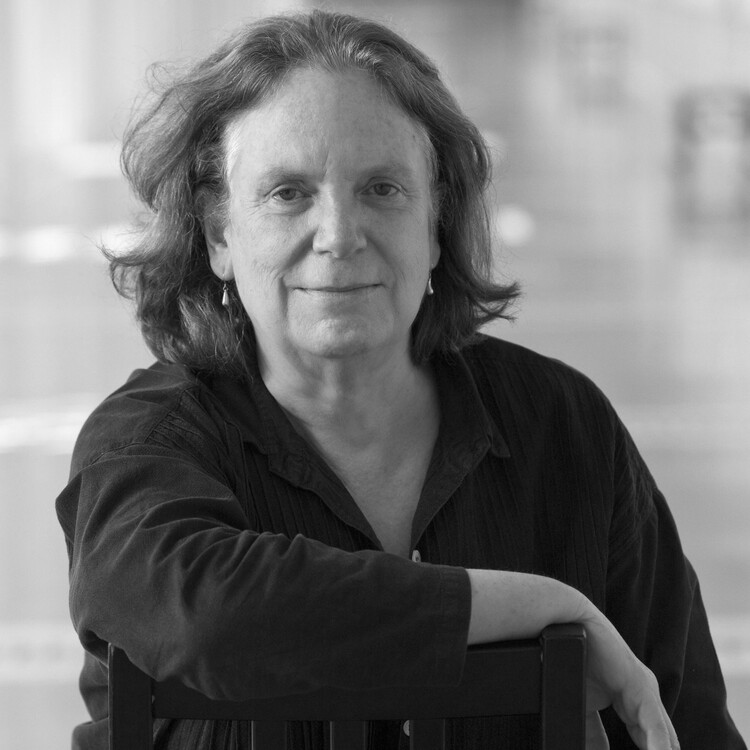
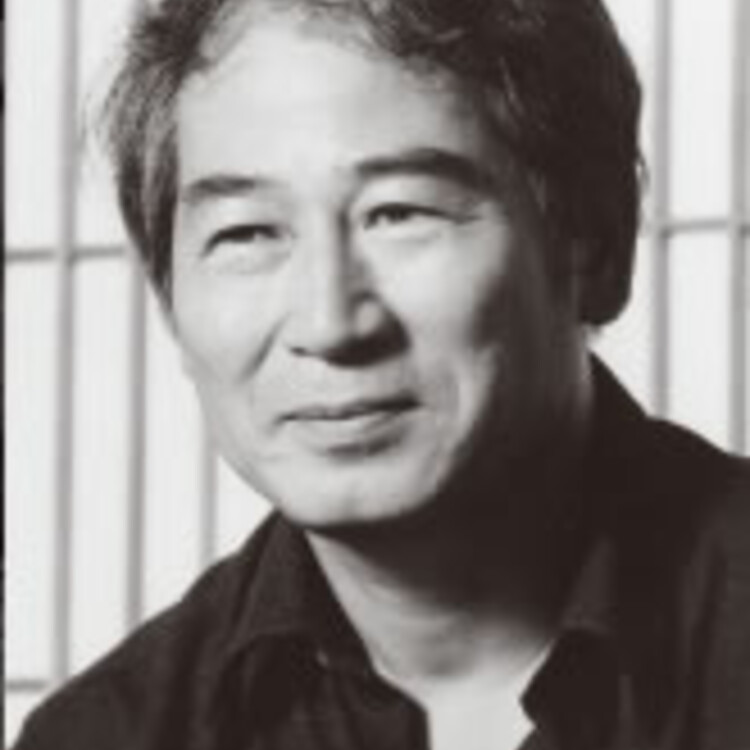
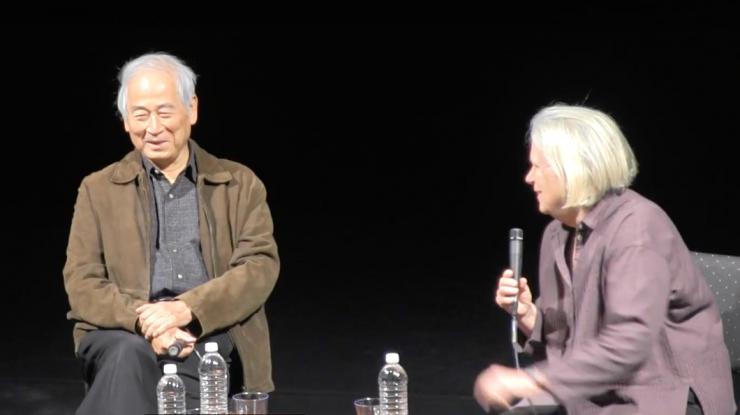
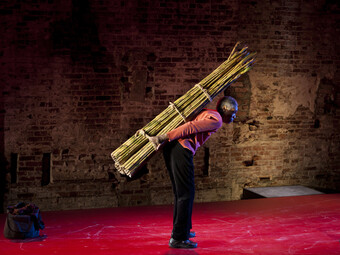





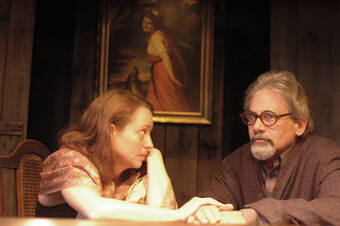


Comments
The article is just the start of the conversation—we want to know what you think about this subject, too! HowlRound is a space for knowledge-sharing, and we welcome spirited, thoughtful, and on-topic dialogue. Find our full comments policy here
Is there a transcription of Suzuki's words in Japanese?
No, not yet. If you know of someone who'd be interested in transcribing the Japanese in this video: https://youtu.be/DGtCo9MQMUU please have them contact [email protected]. Thanks!
Thanks Howl Round for posting this. I teach an Intro to Theatre class at USC, Columbia SC, and always cover Suzuki & Anne Bogart's work. Very nice to have such a timely self exploration by TS to share with my class who will almost certainly be surprised by his attitude toward theatre & theatre training.